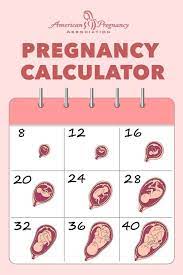Pregnancy Calculator: A Comprehensive Guide
Pregnancy is an exciting and overwhelming experience for women. It involves several aspects that require careful consideration.
One of the essential aspects of pregnancy is calculating the due date and other related information.
Information such as the conception date, ovulation date, and weight gain. This is where pregnancy calculators come in handy.
A pregnancy calculator is a tool that can help women estimate their due date, track their pregnancy milestones, and plan their prenatal care. In this article, we will discuss the different types of pregnancy calculators and their uses.
Types of Pregnancy Calculators
Pregnancy Test Calculator
A pregnancy test calculator is a tool that helps women determine when they should take a pregnancy test based on their menstrual cycle.
The calculator considers the first day of the last menstrual period and the length of the menstrual cycle. It estimates the date of ovulation and the earliest possible date for a pregnancy test.
This can be helpful for women who are trying to conceive or those who are unsure if they are pregnant.
Conception Date Calculator
A conception date calculator is a tool that helps women determine when they conceived. It is based on their due date or the date of their last menstrual period.
The calculator considers the average length of a menstrual cycle and the date of ovulation to estimate the date of conception.
This can be helpful for women who want to know the exact date they conceived, or for those who want to confirm the paternity of the baby.
Pregnancy Weight Gain Calculator
A pregnancy weight gain calculator is a tool that helps women estimate how much weight they should gain during their pregnancy. It is based on their pre-pregnancy weight and height.
The calculator considers the recommended weight gain range for each trimester and helps women track their weight gain throughout their pregnancy.
This can be helpful for women who want to ensure a healthy weight gain during pregnancy. It also helps to avoid complications such as gestational diabetes or hypertension.
IVF Due Date Calculator
An IVF due date calculator is a tool that helps women who conceive through in-vitro fertilization (IVF). It estimates their due date based on the date of embryo transfer or the date of egg retrieval.
The calculator considers the gestational age of the embryo and helps women track their pregnancy milestones, such as the first heartbeat or the first ultrasound.
This can be helpful for women who undergo IVF and want to plan their prenatal care accordingly.
Pregnancy Month Calculator
A pregnancy month calculator is a tool that helps women estimate which month of pregnancy. They are in based on their due date or the date of their last menstrual period.
The calculator considers the average length of a pregnancy and helps women track their pregnancy milestones.
It is such as the end of the first trimester or the beginning of the third trimester. This can be helpful for women who want to plan their maternity leave or baby shower.
Perfect Ovulation Calculator
A perfect ovulation calculator is a tool that helps women estimate their fertile window based on their menstrual cycle. It also focuses on other factors such as age, weight, and health status.
The calculator considers the length of the menstrual cycle, the duration of the luteal phase, and the date of the last menstrual period to estimate the most fertile days for conception.
This can be helpful for women who are trying to conceive and want to maximize their chances of getting pregnant.
How to Use a Pregnancy Calculator?
Using a pregnancy calculator is a simple and straightforward process. Here are the steps to follow:
1: Determine the type of pregnancy calculator you need based on your specific needs. For example, if you want to estimate your due date, use a due date calculator. If you want to estimate your ovulation date, use an ovulation calculator.
2: Enter the required information into the calculator. This information will vary depending on the type of calculator you are using.
For example, if you are using a due date calculator, you will need to enter the date of your last menstrual period.
If you are using an ovulation calculator, you will need to enter the length of your menstrual cycle and the date of your last period.
3: Click on the calculate button or wait for the results to appear. The calculator will then generate the estimated due date, ovulation date, conception date, or other relevant information based on the information you provided.
4: Review the results and plan accordingly. Once you have the estimated due date or other relevant information, you can start planning your prenatal care, maternity leave, baby shower, or other aspects of your pregnancy.
It's important to note that pregnancy calculators are not always 100% accurate. While they can provide a general idea of your due date or other pregnancy milestones, they should not be relied on exclusively.
Always consult with your healthcare provider for personalized advice and guidance throughout your pregnancy.


.png)


.png)
.png)
.png)

.png)


0 Comments